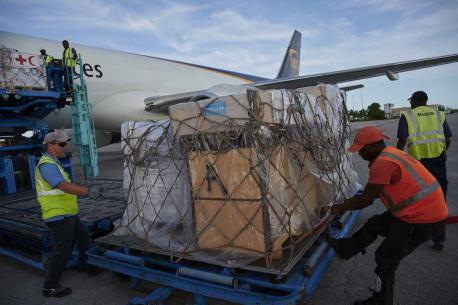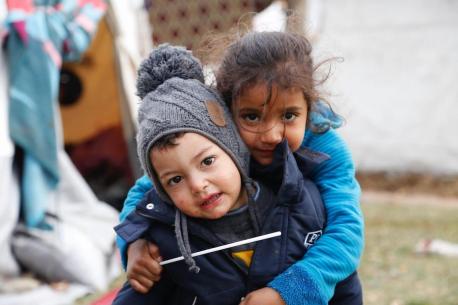
1.5 Tons of UNICEF Supplies Land in Dorian-Devastated Bahamas
As families struggle to cope amid the ruins, the delivery of safe water supplies will help meet the most urgent needs of mothers and children.
Nearly 1.5 tons of UNICEF lifesaving supplies that will help provide safe water for over 9,500 children and families left reeling by Hurricane Dorian have arrived in Nassau, Bahamas.
This first supply shipment of UNICEF humanitarian items was freighted by the International Federation of Red Cross and Red Crescent Societies (IFRC) and includes over 400,000 water purification tablets, several 5,000-liter tanks for at least 2,000 people and 1,000 jerry cans.
An estimated 18,000 children in the Abaco and Grand Bahama areas of the Bahamas have been impacted by Hurricane Dorian. Many urgently need humanitarian assistance. These estimates are based on initial figures from the Caribbean Disaster Emergency Management Agency (CEDMA).
Children and their families who survived the hurricane have lost their homes, their livelihoods, their relatives, and have been left with little water or food.

On 6 September 2019, Katheleh, 4, and her mother, Marianise, were evacuated from Marsh Harbour on Abaco Island to Nassau, Bahamas. Their home was destroyed by Hurricane Dorian, which slammed Abaco for 40 hours. Everything they had left fit within a few small bags. © UNICEF/UN0341871/Moreno Gonzalez
On Saturday, September 8, UNICEF staff toured Abaco, the area hardest hit by Hurricane Dorian. The team witnessed widespread devastation and destruction. In and around Marsh Harbour, schools and hospitals are flattened; houses and roads have collapsed; and cars and boats are hanging in trees.
“Children and their families who survived the hurricane have lost their homes, their livelihoods, their relatives, and have been left with little water or food,” said Youssouf Abdel-Jelil, UNICEF Deputy Regional Director for Latin America and the Caribbean. “The clock is ticking for them to receive humanitarian assistance. Almost five days after the hurricane struck, safe drinking water is now the most urgent and valuable lifesaving item, especially for mothers and children.”
Aerial reconnaissance and preliminary assessments indicate flooding may have compromised water and sanitation systems in Abaco and areas of Grand Bahama. The lack of safe water and adequate sanitation puts children and families at risk of contracting waterborne diseases.
Safe drinking water is now the most urgent and valuable lifesaving item, especially for mothers and children.
“The full scale of the destruction on the ground is still being assessed, but initial assessments indicate that in some parts of Abaco, roads, ports and other transport facilities have been partly or totally destroyed,” said Youssouf Abdel-Jelil, UNICEF Deputy Regional Director for Latin America and the Caribbean. “Damaged infrastructure makes the delivery of humanitarian aid extremely challenging. The most vulnerable families, especially children, are likely to be the hardest to reach,” he added.
In the aftermath of Hurricane Dorian, a UNICEF team was rapidly deployed to the Bahamas. Today a joint UN rapid assessment mission took place in the most affected area of Abaco, Marsh Harbour, to assess the access to critical services like health, education and shelter facilities.
UNICEF is working with the Bahamian government to distribute the lifesaving supplies to families as quickly as possible, in collaboration with UN agencies and other humanitarian partners such as the International Federation of Red Cross and Red Crescent Societies (IFRC).
UNICEF is urgently appealing for $4 million to scale up its humanitarian response and address the most immediate needs of children and families across the Bahamas, including access to safe drinking water and sanitation, nutrition, educational activities and psychosocial support.
Top photo: The first shipment of UNICEF Emergency Supply arrives at the Nassau International Airport, along with IRC supplies, via UPS aircraft. The Bahamas. © UNICEF/UN0341905/Noorani
HOW TO HELP
There are many ways to make a difference
War, famine, poverty, natural disasters — threats to the world's children keep coming. But UNICEF won't stop working to keep children healthy and safe.
UNICEF works in over 190 countries and territories — more places than any other children's organization. UNICEF has the world's largest humanitarian warehouse and, when disaster strikes, can get supplies almost anywhere within 72 hours. Constantly innovating, always advocating for a better world for children, UNICEF works to ensure that every child can grow up healthy, educated, protected and respected.
Would you like to help give all children the opportunity to reach their full potential? There are many ways to get involved.





